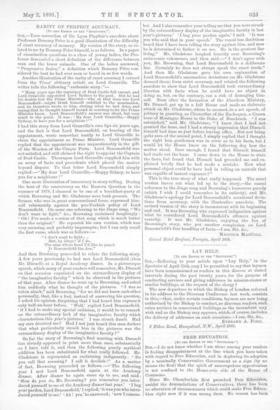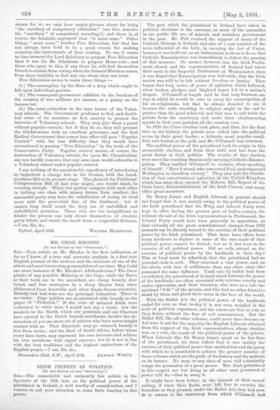FREE EDUCATION.
[To THE EDITOR OF THE "SPECTATOR,"] SIR,—I do not know whether I am alone among your readers in feeling disappointment at the line which you have taken with regard to Free Education, and in deploring its adoption by a nominally Conservative Government as a sign (by no means the first) that the spirit of unscrupulous opportunism is not confined to the Home-rule side of the House of Commons.
Since Mr. Chamberlain first preached Free Education, amidst the denunciations of Conservatives, there has been no alteration of circumstances which could make Free Educe,- tion right now if it was wrong then. No reason has been shown for it ; we only hear empty phrases about its being "the corollary of compulsory education" (are free muzzles the " corollary " of compulsory muzzling P), and there is, of course, the fatalistic argument that "it must come." Other things "must come" besides Free Education, but that has not always been held to be a good reason for making ourselves the instruments of their coming. To me, it seems no less immoral for Lord Salisbury to propose Free Education than it was for Mr. Gladstone to propose Home-rule ; and those who agree to this, if any there be, will find themselves forced to abstain from voting when the General Election comes, from sheer inability to find any one whom they can trust.
Free Education seems to mean three things :— (1.) The assumption by the State of a duty which ought to fall upon individual parents.
(2.) The consequent permanent addition to the burdens of the country of two millions per annum, or a penny on the income-tax.
(3.) The total extinction in the near future of the Volun- tary schools. The Government professes to feel, and doubt- less some of its members do feel, anxiety to protect the interests of Voluntary schools. They may give them a grant without popular control; but if they do so, they will present the Gladstonians with an excellent grievance, and the first Radical Government that comes into office will pass "Popular Control" with far less difficulty than they would have encountered in passing "Free Education" in the teeth of the Conservative Party. Popular control means, of course, the destruction of Voluntary schools, for (pace Mr. Chamberlain) one can hardly conceive that any sane man would subscribe to a Voluntary school under popular control.
I say nothing of the questionable expediency of introducing so important a change late in the Session, with the- Land- purchase Bill at its present stage. The ghost of the Publicans' Compensation Bill of last year might, one would think, be warning enough. When two parties compete with each other in bribing one class with money drawn from another, the successful party may have the satisfaction of seeing its rival meet with the proverbial fate of the hindmost ; but it cannot long itself avoid the deep sea of unfulfilled and unfulfillable promises. Those who are too insignificant to hinder the process can only divest themselves of obsolete party labels, and watch the result from a respectful distance. —I am, Sir, &c.,







































 Previous page
Previous page